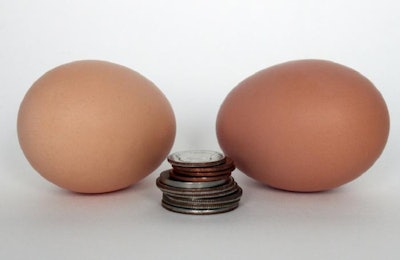
Farmers in Western Australia supplying the Coles supermarket chain say they are being paid less than the cost of production for their eggs from barn-raised hens at a time of high costs, a nationwide egg shortage, and just as the limit on egg consumption in a heart-healthy diet have been lifted.
Australia’s egg producers have invested in alternative layer housing systems over recent years as retailers announced commitments to phase out sales of caged eggs. For the country’s second-largest supermarket chain, Coles, that commitment will apply nationwide from 2023, but already came into force in Western Australia in March of this year.
At the same time, there has been an egg shortage across Australia as many producers were forced to reduce their flocks in the face of rising feed prices resulting from the drought in the east of the country.
“Cost of production for farmers has increased a lot, and we’ve been unable to recoup a lot of those increases from supply chains,” president of the state’s Commercial Egg Producers Association, Ian Wilson told the Australian Broadcasting Corporation (ABC).
As a result of these pressures, egg producers are unable to make the investments required to switch production system, or expand output to meet demand for cage-free eggs, according to Wilson.
Across four southern states, thousands of hens were destroyed after an outbreak of Salmonella, exacerbating the national egg shortage.
Western Australia’s agriculture minister, Alannah MacTiernen told ABC she understands Coles’ decision to end sales of cage eggs to reflect consumer sentiments, but has expressed concerns about the firm’s egg pricing structure, which offers barn eggs for sale for as little as AU$3(US$2.20) per dozen.
Egg producers in the state who sell to wholesalers appear to be in a stronger position, as farm gate prices have been rising in recent weeks, reports ABC.
A search of the online offer from Coles Group reveals its own brand free-range eggs costing between AU$3.00 per pack of 6 eggs (AU$1.00 per 100g) to AUD5.20 for 12 Jumbo eggs (AU$0.65 per 100g). A pack of 12 of its own-brand organic eggs costs AU$8.95 (AU$1.49 per 100g). The cheapest option listed on the retailer’s online offering is a pack of 12 “Farm Fresh” brand cage eggs for AU$3.35 (AU$0.48 per 100g), although the item is not currently available for purchase.
Australia’s top food retailer by market share, Woolworths offers a range of own-brand eggs currently costing between AU$3.40 (for 6 extra-large free range eggs; AU$0.97 per 100g) and AU$4.20 (for 12 eggs of the same type; AU$0.60 per 100g). At AU$0.48 per 100g, the cheapest eggs offered by Woolworths are 12 “Just 4 You” brand extra-large caged eggs at AU$3.35.
Five years ago, Woolworths Group announced that the Australian Capital Territory (Canberra) would be the first area in the country where it would no longer sell cage-produced eggs after December 2018.
Recommendation on egg consumption revised
Just one week ago, the Australian Heart Foundation published its amended recommendations on the consumption of eggs, dairy and meat products.
Based on its own review of the available scientific evidence, the Foundation has lifted the limit on the number of eggs that can be eaten per week in a heart-healthy diet. People with high blood cholesterol or heart disease are recommended to eat no more than seven eggs per week.

















